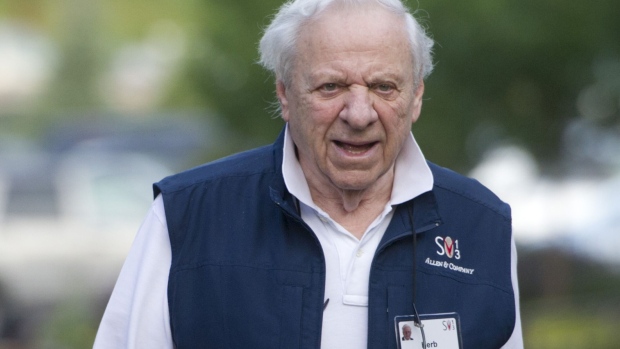Aug 10, 2023
Herbert Siegel, Hollywood ‘White Knight’ Dealmaker, Dies at 95
, Bloomberg News

(Bloomberg) -- Herbert Siegel, who turned boatmaker Chris-Craft Industries Inc. into a media company that he later sold to Rupert Murdoch’s News Corp. for more than $5 billion, has died. He was 95.
He died at his home in New York City on Aug. 5 of heart failure, the New York Times reported, citing his wife Jeanne.
Siegel amassed large stakes in Paramount Pictures and Twentieth Century-Fox Film Corp., vexing the incumbent managers before selling his positions at a considerable profit. His actions triggered the 1966 sale of Paramount to Charles Bluhdorn’s Gulf & Western Industries Inc. and the 1981 sale of Twentieth Century-Fox to Denver oilman Marvin Davis.
In the 1990s, Siegel saw no undervalued Hollywood assets to buy. He focused instead on building the value of 10 television stations he controlled. Chris-Craft started a “fifth” network in 1995 in partnership with Viacom Inc. The United Paramount Network, dubbed UPN, lost more than $800 million by 2000 when Chris-Craft sold its stake to Viacom.
News Corp. Deal
Siegel was also known for his role at Warner Communications Inc. As a “white knight,” he helped that company fend off a takeover bid by News Corp. in the mid-1980s. Siegel’s Chris-Craft remained the largest — and most nettlesome — Warner shareholder until that company was sold to Time Inc. in 1990.
News Corp. ultimately acquired Chris-Craft and two affiliated television companies from Siegel for about $5 billion in 2001.
Herbert Jay Siegel was born in Philadelphia on May 7, 1928, to Jacob and Fritzi Stern Siegel. He graduated from Lehigh University in 1950 and married Ann Levy, the daughter of Isaac Levy, a Philadelphia lawyer and co-founder of Columbia Broadcasting System. The couple divorced in 1960 and remarried two years later. They had two sons, John and William, who later became executives at Chris-Craft and its divisions.
Siegel’s in-laws introduced him to show business. Frank Sinatra sang at his wedding.
Using $100,000 from a trust fund provided by his father, Siegel followed his wife’s relatives in investing in Official Films, a packager of television shows. He also bought and sold a variety of manufacturing companies, including his father’s topcoat business, a Pittsburgh brewery, a car-wax manufacturer and a jukebox maker, activities that netted him a $2 million profit.
Assembling Company
In 1961, Siegel put together a small conglomerate called Baldwin-Montrose by completing a three-way merger of a Fort Wayne, Indiana-based brewery, Montrose Chemical Co. and Baldwin Rubber Co. He acquired control of the General Artists talent agency, which represented actor Jackie Gleason, among others.
Siegel teamed with Broadway producer Ernest Martin to buy 9% of Paramount Pictures in 1965. The two gained seats on Paramount’s board but squabbled with other directors.
Paramount filed an antitrust lawsuit against Baldwin-Montrose, claiming that its stake in General Artists Corp. posed a conflict of interest. Siegel sold the talent agency and later sold his Paramount stake to Gulf & Western. Siegel and Martin made a profit of $2.6 million.
Siegel acquired control of Chris-Craft in 1968. He retained the corporate moniker after selling its namesake boat division in 1981.
In 1969, Chris-Craft began a takeover bid for Piper Aircraft Corp. that resulted in an eight-year legal battle and established Siegel’s reputation for tenacity. A federal appellate court awarded Chris-Craft the then-unheard-of sum of $35.8 million, but the US Supreme Court ultimately ruled against Chris-Craft. Siegel sold his stake in Piper for a nominal profit and turned again to Hollywood.
Stalking Fox
Siegel disclosed in early 1978 that he had acquired a 5% stake in Twentieth Century-Fox. He added to his holdings until Chris-Craft became the studio’s largest shareholder with 20% of its stock in 1980. He sold his stake to Davis, making a profit of almost $50 million on his investment.
His attention shifted to Warner Communications Inc. as it came under siege by Murdoch’s News Corp.
Warner’s stock had tumbled with losses from its Atari video game unit in 1983, and Murdoch acquired a 7% stake late in the year. Siegel came to Warner’s rescue with a deal to sell 42.5% of Chris-Craft’s BHC television station unit in exchange for 19% of Warner’s voting shares. The arrangement erected barriers to Murdoch, who was then an Australian citizen, because federal law limits foreign investment in US broadcast licenses.
Siegel — an outwardly affable man who said he didn’t want to run Warner — was critical of the company’s lavish spending. Warner Chairman Steve Ross didn’t welcome the second-guessing and within a year was brushing aside Siegel’s contribution. Their cursory friendship unraveled publicly in 1984, and Siegel remained a thorny presence for five more years.
In 2005, Siegel’s wife, Ann, died. He married Jeanne Sorensen two years later.
©2023 Bloomberg L.P.


